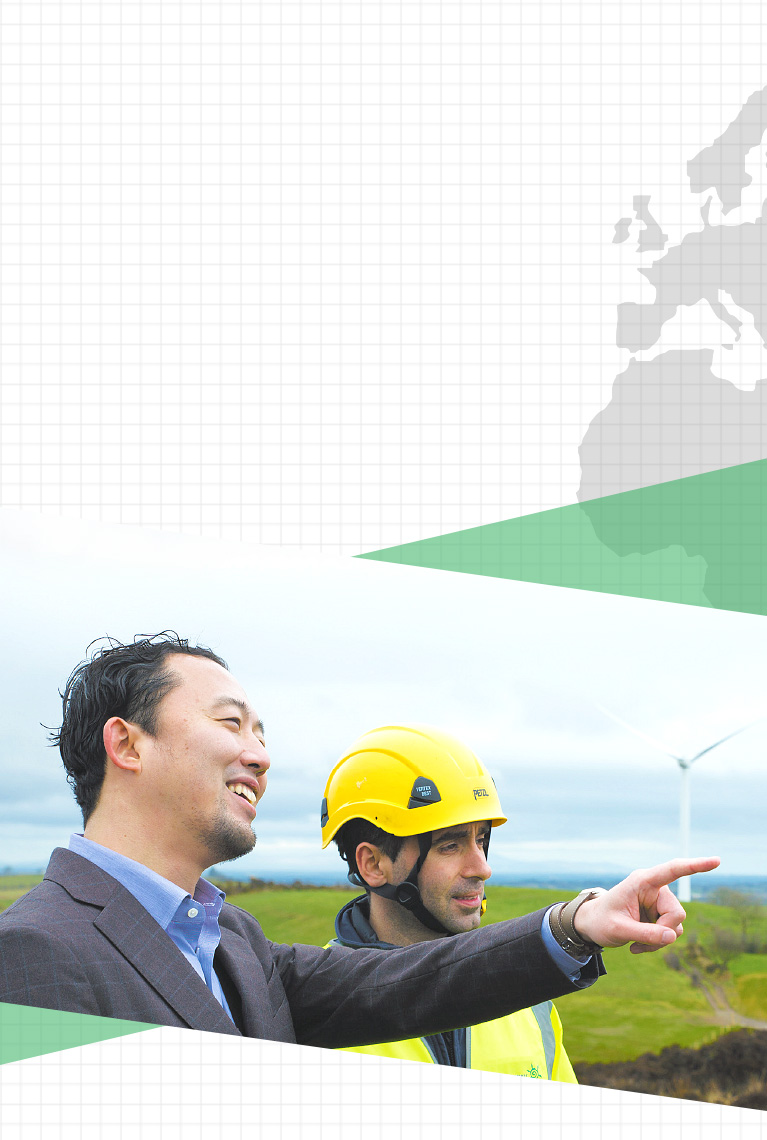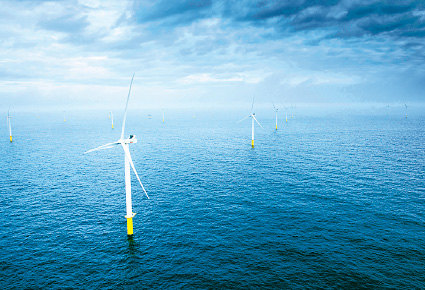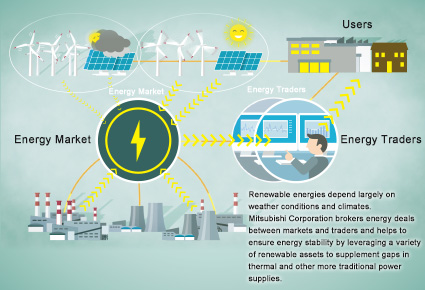Vol.2 Electricity Trading in Europe


Vol.2
Electricity Trading in Europe
Right Time, Right Capacity
– Supplying a Continent with Clean, Affordable Energy
This series introduces some of the MC Group's global operations and the people behind them. Our second installment features some of the challenges being undertaken by Mr. Takehiro Taguchi, a financial executive at the Dublin-based electricity trader ElectroRoute. Electricity trading is a growing business in Europe, which leads the world in the development and use of renewable energies.

In Europe, wind power is no longer considered "too expensive," and is the leading provider of clean energy
upper:In Europe, wind power is no longer considered "too expensive," and is the leading provider of clean energy
lower:The electricity trading business model
European Energy Markets & Growth of the Sharing Economy
Europe is one of the world's most environmentally aware regions, and more than 50% of the energy generated in some European countries comes from renewable sources like wind and solar power. Advances in technology have made it possible for all households to share that energy, with excesses generated in some areas either sold on energy markets or used to cover shortages in other areas. A lot of effort has been made in recent years to develop and promote this kind of sharing economy.
“A new era is approaching, in which our challenge will be not only to create electricity, but also to figure out how best to share it,” says Keiichi Suzuki, CEO of Diamond Generating Europe (hereinafter “DGE”), a wholly owned subsidiary of Mitsubishi Corporation (hereinafter “MC”). DGE is engaged in the development, construction, and operation of offshore wind farms and other innovative renewable projects in Europe and the Middle East. “Our business model must continue to evolve, so that we can provide the kind of energy that each user needs,” explains Suzuki. “The amount of energy that can be generated from renewable sources largely depends on climate, and customers want the kind of services that will supply that energy at the right times and in the right capacities, and of course, at the right prices too.”
Essential to that business model are the abilities to broadly monitor energy markets and make adjustments to balance supply and demand, so that buyers get stable supplies at fair prices. With that in mind, in 2016 MC reached an agreement for capital participation in ElectroRoute through DGE. ElectroRoute has grown rapidly from a start-up providing comprehensive services to both producers and users of energy. It trades the rights to generate or transfer electricity from its various power facilities in eight European countries. Helping out with its mergers and acquisitions is 36 year-old Takehiro Taguchi, who was seconded to the company from MC.

ER is staffed with experienced electricity traders
Gaining Advanced Expertise in Electricity Trading & Supporting Renewable Energy Markets
Since joining MC, Taguchi has specialized in renewable energy businesses, and the projects he has worked on include the recycling of solar-battery raw materials and the launching of a mega-solar power generation plant. As a financial executive at ElectroRoute, he is in charge of integrating the company's consolidated financial reporting, internal controls, and other systems with those at MC, and he also assists with business planning. It is not easy to get a start-up with advanced IT systems and expertise to accept such a radically different corporate culture as MC's, and Taguchi admits to having struggled at times, but he has also found his assignment stimulating. “I am on the cutting edge of the world's power markets, and there is so much here that I could never experience back in Japan,” he says.
Europe's international power grid was built 100 years ago, and the cross-market sharing of electricity started relatively early. For example, when it is sunny on the European continent but rainy in London, abundant and low-cost excess solar power from the former can be transferred to and used in the latter.
Traders check the climate and other factors in each region very carefully before forecasting demand and making their trades. This business is possible because of Europe's well-established energy markets and history of trading electricity. Furthermore, a buyer who wants to hedge the risk of price fluctuations can agree to purchase electricity at a fixed price for the next one or two years. “There are some excellent traders working at ElectroRoute,” says Taguchi. “I hope to acquire some of their advanced know-how and ground myself in the company's day-to-day operations, so that I can one day help to develop these kinds of businesses in other parts of the world.”
ElectroRoute is now in the process of expanding its services to provide know-how in electricity trading to power plants and other energy users. “Because our company plays a central role in connecting power plants and customers to electricity markets, we hope to become a change agent capable of balancing both our electricity trading operations and our services,” Suzuki tells us. “Mr. Taguchi is a dedicated professional who is making a difference on the front lines of our power business, and I have big expectations of him.”
Sowing the Seeds of New Business
More countries around the world are adopting renewable energy policies, and developments in the sharing economy have also been gaining momentum, as evidenced by the emergence of companies like Uber and Airbnb.
Taguchi explains how the world is changing, and how different industries, including the power industry, are looking for ways to connect people: “It is a difficult challenge in the energy market, but it is also an opportunity, and one that ElectroRoute has taken the first step towards seizing. The experience we gain in Europe is certain to be applicable to other regions and businesses.”
While pioneering new businesses comes with heavy responsibility, the results can be tremendously rewarding. The business of electricity trading helps to spread the use of natural energy and has great social and environmental implications. Taguchi's ambitions are clear. “Being a start-up, ElectroRoute has some good momentum, and I am hoping that we will be able to effectively fuse its growth strategy with MC's know-how and business foundations,” he says. “By combining those strengths, we should be able to sow the seeds of our next-generation earnings drivers in the power business.”
After the Interview
To research this story, we visited a hilltop wind farm on the outskirts of Dublin. The electricity generated there is sold to users in the UK and the European continent, and is no doubt helping to improve quality of life. Projects like these are a sign of how close we are to realizing a sustainable future, in which electricity trading helps to promote the use of clean energies.The sun never sets on Dublin.With each pint of Guinness, Taguchi grows more talkative about the difficulties he has faced and the pride he feels in being the first MC employee seconded here, and about dreams of broadening his horizons.
From the May 31, 2018 edition of The NIKKEI, Advertising




